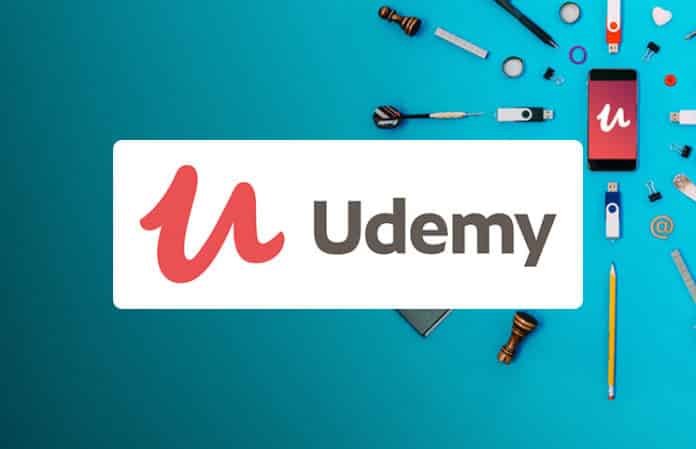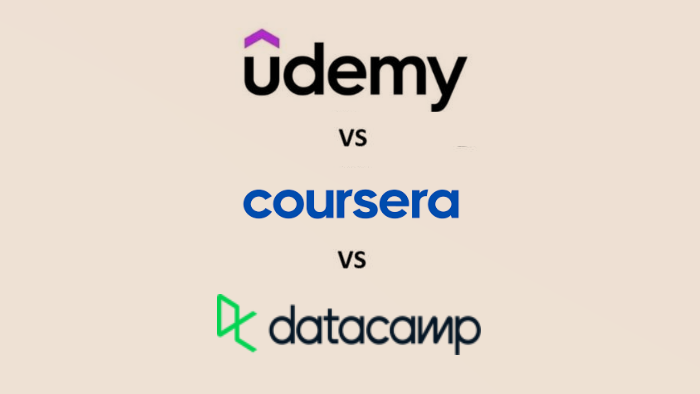The online education landscape is in a constant state of flux, and the choice of the right platform can wield significant influence over your educational journey. Within the realm of online education, three prominent contenders—Udemy vs Coursera vs Datacamp—emerge as leading figures.
These platforms present a plethora of opportunities for skill enhancement and knowledge enrichment. Each platform possesses distinct characteristics and features that render it suitable for diverse types of learners and educational objectives.
In this comprehensive guide, we embark on an exhaustive exploration of each platform, shedding light on their individual strengths, considerations for selection, and noteworthy distinctions. By the conclusion of this guide, you will be well-prepared to make an informed decision regarding the platform that aligns seamlessly with your educational aspirations.
What’s in this article?
- 1 Udemy: Diverse Courses at Your Pace
- 2 Coursera: Accredited Learning and Structured Paths
- 3 DataCamp: Specialized Learning in Data Science
- 4 Differences Between Udemy vs Coursera vs Datacamp
- 5 Which Platform Is Right for You?
- 6 Additional Resources and Next Steps
- 7 FAQs: Udemy vs Coursera vs DataCamp: Which Is Best for You?
- 8 Conclusion: Udemy vs. Coursera vs. DataCamp: Which Is Best for You?
Udemy: Diverse Courses at Your Pace
Description of Udemy
Udemy is an online learning platform renowned for its extensive catalog of courses covering a myriad of subjects. Udemy functions as a dynamic marketplace where instructors can craft and present their courses to a diverse global audience. Whether your interests lie in web development, digital marketing, photography, or personal development, Udemy overview offers a wide spectrum of courses designed to cater to your specific educational requirements.
Strengths of Udemy
1. Diverse Course Selection: Udemy boasts a vast and diverse library of courses, with over 150,000 options to choose from. This diversity ensures that learners from various backgrounds and interests can find relevant content.
2. Affordability: Many Udemy courses are available at affordable prices, and the platform frequently offers discounts and promotions. This affordability factor renders it an appealing option for learners mindful of their budget.
Furthermore, Udemy courses predominantly follow a self-paced structure, granting learners the freedom to navigate the content at their individual pace. This adaptability proves advantageous for individuals with hectic schedules or a preference for autonomous learning.

Considerations for Choosing Udemy
While Udemy courses offers a wealth of flexibility, there are certain considerations to keep in mind:
- Course quality varies. Since Udemy allows anyone to create and publish courses, the quality can vary significantly. It’s essential to read reviews and check course ratings before enrolling.
- No Accreditation: Udemy courses do not offer formal degrees or certificates. They are better suited for acquiring practical skills and knowledge than for earning accredited credentials.
- Limited Interaction: Udemy courses may lack the interactive elements and community engagement found on other platforms.
Table: Udemy Features and Highlights
| Feature | Description |
| Diverse Course Selection | Over 150,000 courses covering various topics |
| Affordability | Many courses are available at budget-friendly prices |
| Self-Paced Learning | Flexibility to learn at your own pace |
Coursera: Accredited Learning and Structured Paths
Description of Coursera
Coursera is a renowned online education platform that partners with top universities and institutions worldwide to offer accredited courses, specializations, and even full-degree programs. It provides a structured learning experience that blends on-demand and scheduled courses.
Strengths of Coursera
Accredited Certificates and Degrees: Coursera courses offers degree programs that are accredited by recognized institutions. This is a significant advantage for those seeking formal credentials.
1. Structured Learning Paths: Coursera courses provides structured learning paths through specializations, allowing learners to master a specific skill or subject area. These paths often include a series of courses and a capstone project.
2. High-Quality Content: Coursera courses are developed in collaboration with top universities, ensuring high-quality educational content.
Also Read : The 15 Best DataCamp Courses and Online Training
Considerations for Choosing Coursera
While Coursera courses offers accredited learning opportunities and structured paths, there are some considerations to weigh:
- Cost: While Coursera courses provides a free option, accredited certificates and degree programs typically come with a cost.
- Scheduled Courses: Some learners may find the scheduled format of courses less flexible than the self-paced approach offered by Udemy.
- Specializations May Be Pricey: Completing a full specialization can be more expensive than individual courses, so budget-conscious learners should plan accordingly.
Table: Coursera Courses Features and Highlights
| Feature | Description |
| Accredited Certificates | Courses and degrees accredited by top institutions |
| Structured Learning Paths | Specializations with a series of courses and projects |
| High-Quality Content | Collaboration with renowned universities for course content |
DataCamp: Specialized Learning in Data Science

Description of DataCamp
DataCamp is a platform tailored for data science enthusiasts and professionals. It focuses on providing hands-on learning experiences through interactive coding exercises, making it a standout choice for those in the fields of data analysis, machine learning, and statistics.
Strengths of DataCamp
Hands-on Learning: DataCamp courses excels at providing a practical, hands-on approach to learning data science. Learners engage with real-coding exercises and gain valuable experience.
1. Specialized Curriculum: DataCamp’s curriculum is laser-focused on data science and related fields, making it an excellent choice for those seeking expertise in this domain.
2. Career Relevance: Data science skills are in high demand, and DataCamp equips learners with the skills needed for a competitive edge in the job market.
Considerations for Choosing DataCamp
While DataCamp courses is a powerful platform for data science, there are some considerations to keep in mind:
- Specialization: DataCamp’s primary strength is in data science. If your interests or learning goals lie outside of this field, you may find limited course offerings.
- Certifications: DataCamp courses offers skill assessments and certificates, but they may not hold the same weight as accredited degrees for some employers.
- Coding Intensive: DataCamp’s focus on coding may not be suitable for those who prefer less technical learning paths.
Table: DataCamp courses Features and Highlights
| Feature | Description |
| Hands-On Learning | Interactive coding exercises for practical experience |
| Specialized Curriculum | Focused on data science and related fields |
| Career Relevance | Skills in high demand for data-related careers |
Also Read : Is Udemy Worth It? Course Review
Differences Between Udemy vs Coursera vs Datacamp
Having delved into the strengths and considerations of each platform, it’s essential to discern the key distinctions between Udemy vs Coursera vs DataCamp to facilitate an informed decision-making process:

Course Selection and Diversity
1. Udemy: offers a vast and diverse range of courses created by instructors worldwide, spanning numerous subjects.
2. Coursera: provides a mix of accredited courses, specializations, and degrees from top universities, with a focus on structured learning paths.
3. DataCamp: Having delved into the strengths and considerations of each platform, it’s essential to discern the key distinctions between Udemy, Coursera, and DataCamp courses to facilitate an informed decision-making process:
Course Selection and Diversity
- Udemy: offers a vast and diverse range of courses created by instructors worldwide, spanning numerous subjects.
- Coursera: provides a mix of accredited courses, specializations, and degrees from top universities, with a focus on structured learning paths.
- DataCamp: specializes in data science and related fields, offering a narrower but more focused selection of courses.
Accreditation and Certificates
- Udemy: does not provide formal accreditation; courses offer certificates of completion.
- Coursera: offers accredited certificates and degree programs from renowned institutions.
- DataCamp: Offers skill assessments and certificates but not formal degrees.
Learning Experience
- Udemy: self-paced learning with flexibility to start and finish courses at your own pace.
- Coursera: Blends on-demand and scheduled courses, often with set start dates and deadlines.
- DataCamp: Data science and related fields, offering a narrower but more focused selection of courses.
Accreditation and Certificates
- Udemy: Does not provide formal accreditation; courses offer certificates of completion.
- Coursera: Offers accredited certificates and degree programs from renowned institutions.
- DataCamp: Offers skill assessments and certificates but not formal degrees.
Learning Experience
- Udemy: Self-paced learning with flexibility to start and finish courses at your own pace.
- Coursera: Blends on-demand and scheduled courses, often with set start dates and deadlines.
- DataCamp: Interactive coding exercises for hands-on learning.
Target Audience
- Udemy: Diverse audience, suitable for learners of all backgrounds and interests.
- Coursera: Learners seeking accredited certificates, degree programs, or structured learning paths.
- DataCamp: Those interested in data science and related fields, particularly data professionals and analysts.
Which Platform Is Right for You?
The choice between Udemy, Coursera, and DataCamp ultimately depends on your individual learning goals, preferences, and circumstances.
- Choose Udemy if you want a broad range of course options, affordability, and the flexibility to learn at your own pace. It’s ideal for practical skill acquisition and exploration.
- Choose Coursera if you value accredited certifications, degree programs, and a mix of self-paced and instructor-led learning. It’s suitable for those looking to earn formal credentials.
- Choose DataCamp if you have a specific interest in data science and prefer a focused, interactive learning experience with hands-on coding exercises.
Also Read : 30 Best Udemy Courses To Check Out
Additional Resources and Next Steps
In addition to Udemy, Coursera, and DataCamp, there are numerous other online learning platforms and resources available. Here are some next steps to further explore online education:
- edX: Another leading platform offering a wide range of courses from top institutions.
- Khan Academy: Known for its free educational content, particularly in math and science.
- LinkedIn Learning: offers courses on professional development and skills.
- MOOC Aggregators: Websites like Class Central and MOOC List help you discover courses from multiple platforms.
- Industry-Specific Platforms: Depending on your field, there may be specialized platforms that offer relevant courses.
FAQs: Udemy vs Coursera vs DataCamp: Which Is Best for You?
Q1:Can I earn a formal degree from Udemy, Coursera, or DataCamp?
A1: Coursera offers accredited degrees and certificates from renowned institutions. Udemy and DataCamp provide certificates of completion but do not offer formal degrees.
Q2: Are the courses on these platforms self-paced?
A2: Udemy primarily offers self-paced courses. Coursera provides both on-demand and scheduled courses, while DataCamp’s courses often involve interactive coding exercises and can be completed at your own pace.
Q3: Are there free courses available on these platforms?
A3: Yes, all three platforms offer free courses, but the extent of free content varies. Coursera’s free courses often have limited access to certain features, while Udemy offers many free courses, and DataCamp provides some free content.
Q4: Do these platforms provide career support or job placement services?
A4: Coursera offers a feature called Coursera Plus, which includes job search and career support. DataCamp focuses on building skills relevant to data-related careers. Udemy does not offer specific job placement services.
Q5: Can I access courses on these platforms on mobile devices?
A5: Yes, all three platforms offer mobile apps, allowing you to access courses and content on your smartphone or tablet.
Q6: How do I know if a course is of high quality on Udemy, given that anyone can create courses?
A6: Check course ratings, read reviews from other learners, and explore the instructor’s credentials and expertise to gauge the quality of a course.
Conclusion: Udemy vs. Coursera vs. DataCamp: Which Is Best for You?
In summary, the choice between Udemy, Coursera, and DataCamp hinges on your specific learning objectives and preferences. Udemy offers a vast array of affordable courses ideal for self-paced learners. Coursera excels in accredited programs and structured paths, while DataCamp is tailored for hands-on data science enthusiasts. Consider your goals and priorities when selecting the platform that aligns best with your educational journey. Online learning has never been more accessible and diverse, providing endless opportunities for personal and professional growth.

